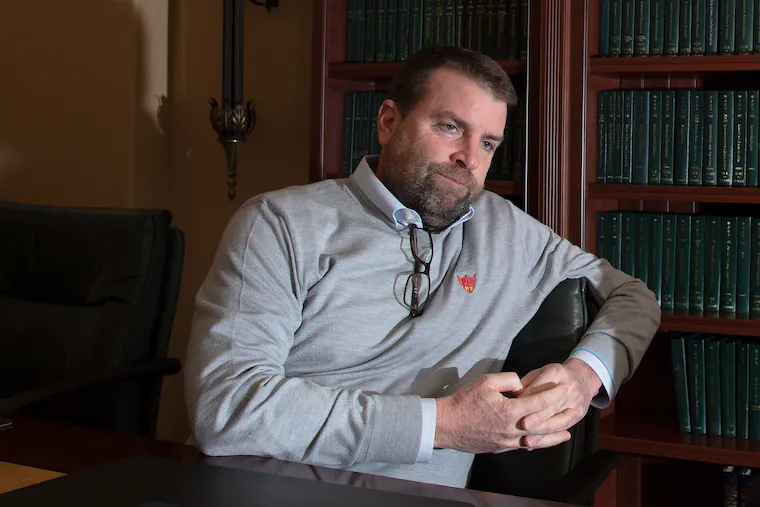Copyright The Philadelphia Inquirer

The first message Imoleayo Samuel Aina sent to Jack Sullivan was innocuous enough. “Wyd” Aina wrote, meaning: “What you doing?” Aina, who was living in Nigeria, used Instagram to reach out to Sullivan, a student at Kutztown University, and was using a fake account to pose as a woman named “Alice Dave.” Aina’s messages then quickly progressed from a deceptive campaign of flirtation into a twisted form of blackmail, court records show — one involving a request for intimate photographs and then relentless demands for money. The episode reached a tragic conclusion just 19 hours later, the records show, when Sullivan, overcome by dread and shame, sent a message saying he didn’t think he had sufficient funds to pay. Three minutes after that, Sullivan, 20, walked onto the tracks near the Jenkintown SEPTA station, where he was struck and killed by a passing train. In federal court Tuesday, Aina was punished for his role in the scheme as U.S. District Judge Joel H. Slomsky sentenced him to six years in prison followed by five years of supervised release. Slomsky called the decision one of the most difficult he’s ever faced on the bench. But he decided to accept the terms of a plea agreement Aina had entered into with the U.S. Attorney’s Office, he said — one in which prosecutors recommended that Aina, charged with crimes including cyberstalking resulting in death, receive a sentence of no more than six years behind bars. “Any judge that accepts this guilty plea is doing so with a very heavy heart, that’s for sure,” Slomsky said. Sullivan’s parents, Kate and Jim, said they didn’t believe federal sentencing guidelines sufficiently captured the gravity of Aina’s crimes. They were grateful to prosecutors for pursuing a novel case — one that authorities described as the first prosecution of an international defendant for such crimes against an American adult. Still, the Sullivans said they wished Aina had faced a stiffer penalty for his actions, which led to the death of a thoughtful, caring, and curious young man — an environmental science student who enjoyed hiking, fishing, and bicycling, and who was dedicated to his parents, three siblings, and extended network of family and friends. Aina “took advantage of a sweet, trusting boy in the prime of his life,” Kate Sullivan said in court Tuesday. Jim Sullivan said Aina, by contrast, was part of “a global organized criminal network assaulting our children in their homes.” The case was an example of what authorities have come to call “sextortion,” episodes in which perpetrators seek to strike up flirtatious conversations with people online — primarily teenage boys — then lure their victims into sending compromising messages or photos and blackmail them in exchange for money. The crime has exploded in recent years, according to the FBI. More than 54,000 cases were reported last year and at least 20 victims of such crimes have died by suicide since 2021. Perpetrators typically operate from West African or Southeast Asian countries while pretending to be American teenage girls, authorities said. Lawmakers in various states have sought to pass laws targeting aspects of social media that make such exploitation easier. In Mississippi, for example, lawmakers passed a bill requiring social media users to verify their ages. And more than a dozen states have sued TikTok and accused the company of employing an algorithm that is deliberately addictive and harmful to young people. Sullivan’s parents have filed suit against Meta, which owns Facebook and Instagram, and Snap Inc., which owns Snapchat, saying the companies created deliberately addictive apps without protections for vulnerable users, and helped lead to the death of their son. “There’s a hole in our hearts,” Kate Sullivan said in court Tuesday, “and we miss [Jack] every day, every minute.” Aina first messaged Sullivan the night of Jan. 3, 2023. At the time, Sullivan had been watching a movie with his father on the couch in their Abington home. The online conversation moved quickly, according to court records: Aina directed Sullivan to send explicit images of himself on Snapchat, then threatened to disseminate them if Sullivan didn’t send money. By the next afternoon, court records say, Sullivan had been locked out of his bank account, but Aina’s demands were continuing. At 3:52 p.m., court records said, Sullivan sent Aina a message saying: “I don’t even think I have enough for it.” Three minutes later, he stepped in front of the train. Even after Sullivan’s death, prosecutors said, Aina continued his harassment campaign — first by continuing to contact Sullivan, who he didn’t know had died, and then by reaching out to some of Sullivan’s friends, whom he found on Instagram. Several of those friends told Aina — who was continuing to use fake accounts — about Sullivan’s death, court records said, and one of them sent a copy of Sullivan’s obituary. Still, prosecutors said Aina went on trying to continue extorting students at Kutztown, threatening in some instances to shoot victims or commit suicide if he didn’t receive money. Federal prosecutors in Philadelphia filed charges against Aina and two coconspirators in September 2023, and Aina and one of the men — Samuel Olasunkanmi Abiodun — were extradited later that year. In June, Abiodun was sentenced to five years in prison for helping launder Aina’s proceeds from the scheme. The other accused coconspirator, Afeez Olatunju Adewale, remains in Nigerian custody. Aina, for his part, apologized in court Tuesday, saying: “I can’t defend the wrongs I have done. And I know I don’t deserve forgiveness.” Jim Sullivan said even if he was disappointed by the length of Aina’s sentence, he hoped the case might send a message to anyone considering committing similar crimes. “We were hoping for something much greater,” he said, “but there wouldn’t have been a number that’s enough.”



